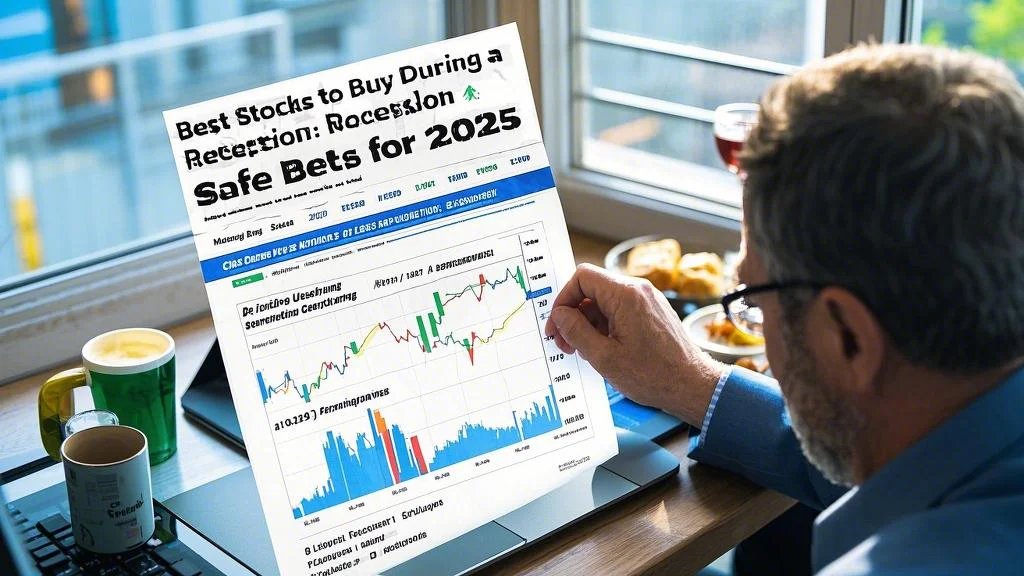Best Stocks to Buy During a Recession: Safe Bets for 2025

Why Recession-Proof Stocks Are Essential for 2025
As economic uncertainty looms and experts predict a potential recession in 2025, investors are turning to recession-proof stocks to safeguard their portfolios. These stocks belong to companies that provide essential goods and services, which remain in demand regardless of economic conditions. Industries like healthcare, utilities, and consumer staples are classic examples, as people continue to need medical care, electricity, and everyday household items even during downturns. Additionally, companies with strong balance sheets, consistent cash flow, and a history of paying dividends tend to perform well during recessions. By focusing on recession-proof stocks, investors can reduce their exposure to market volatility and ensure a more stable financial future. The key is to identify companies that are not only resilient but also positioned to thrive in challenging times.
How Inflation Impacts Investment Choices During a Recession
Inflation is a critical factor to consider when selecting recession-proof stocks. Rising inflation can erode purchasing power and increase costs for businesses, making it harder for some companies to maintain profitability. However, certain sectors are better equipped to handle inflationary pressures. For example, companies in the commodities sector, such as those involved in energy or agriculture, often benefit from higher prices for raw materials. Similarly, businesses with strong pricing power, like those in the consumer staples or healthcare industries, can pass on increased costs to consumers without significantly impacting demand. Understanding the inflation impact on investments is essential for building a resilient portfolio that can withstand both recessionary pressures and inflationary challenges.
Top Sectors to Focus on During an Economic Downturn
When preparing for a potential recession, it’s important to focus on sectors that have historically performed well during economic downturns. Healthcare is a prime example, as demand for medical services and pharmaceuticals remains steady regardless of the economic climate. Utilities are another safe bet, as households and businesses continue to require electricity, water, and gas. Consumer staples, including companies that produce food, beverages, and household products, also tend to be resilient during recessions. Additionally, the technology sector, particularly companies involved in cybersecurity and cloud computing, has shown strength in recent downturns due to the increasing reliance on digital infrastructure. By concentrating on these sectors, investors can implement effective economic downturn strategies and protect their portfolios from significant losses.

Stock Market Forecast: What to Expect in 2025
As we look ahead to 2025, the stock market forecast is filled with uncertainty, but also opportunities. While a recession may lead to increased volatility and declining stock prices in certain sectors, it can also create buying opportunities for undervalued companies. Historically, markets tend to recover after a downturn, and investors who remain patient and focused on long-term goals can benefit from the eventual rebound. Sectors like renewable energy, technology, and healthcare are expected to continue growing, driven by long-term trends such as climate change, digital transformation, and aging populations. By staying informed about the stock market forecast and maintaining a diversified portfolio, investors can navigate the challenges of a recession and position themselves for future growth.
The Role of Commodities in a Recession-Resilient Portfolio
Commodities are another important consideration for investors seeking to build a recession-resilient portfolio. During economic downturns, commodities like gold and silver often serve as safe-haven assets, preserving value when other investments decline. Additionally, energy commodities such as oil and natural gas can perform well, particularly if supply constraints or geopolitical tensions drive prices higher. Agricultural commodities, including wheat and corn, also tend to remain in demand, as food is a basic necessity. Understanding the commodities market outlook can help investors identify opportunities to hedge against inflation and economic uncertainty. By incorporating commodities into their portfolios, investors can enhance diversification and reduce overall risk.
Key Strategies for Investing During a Recession
Investing during a recession requires a strategic approach to minimize risks and maximize returns. One effective strategy is to focus on high-quality companies with strong balance sheets, low debt, and consistent cash flow. These companies are better positioned to weather economic challenges and continue paying dividends. Another strategy is to adopt a defensive stance by increasing allocations to recession-proof stocks and reducing exposure to cyclical sectors like travel and luxury goods. Dollar-cost averaging, or investing a fixed amount at regular intervals, can also help mitigate the impact of market volatility. Finally, staying informed about the stock market forecast and adjusting your strategy as conditions evolve is crucial for long-term success. By following these economic downturn strategies, investors can navigate a recession with confidence.
Conclusion: Building a Resilient Portfolio for 2025
As the possibility of a 2025 recession looms, investors must take proactive steps to protect their portfolios and capitalize on opportunities. By focusing on recession-proof stocks, understanding the inflation impact on investments, and staying informed about the stock market forecast, investors can build a resilient portfolio that withstands economic challenges. Additionally, incorporating commodities and adopting effective economic downturn strategies can further enhance portfolio stability. While recessions are inherently uncertain, they also present opportunities for savvy investors to acquire undervalued assets and position themselves for long-term growth. By staying disciplined and focused on quality investments, you can navigate the uncertainties of 2025 and emerge stronger on the other side.